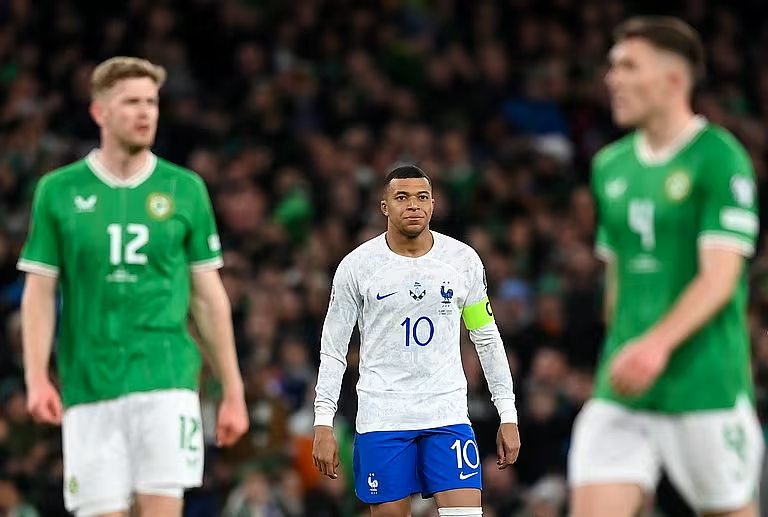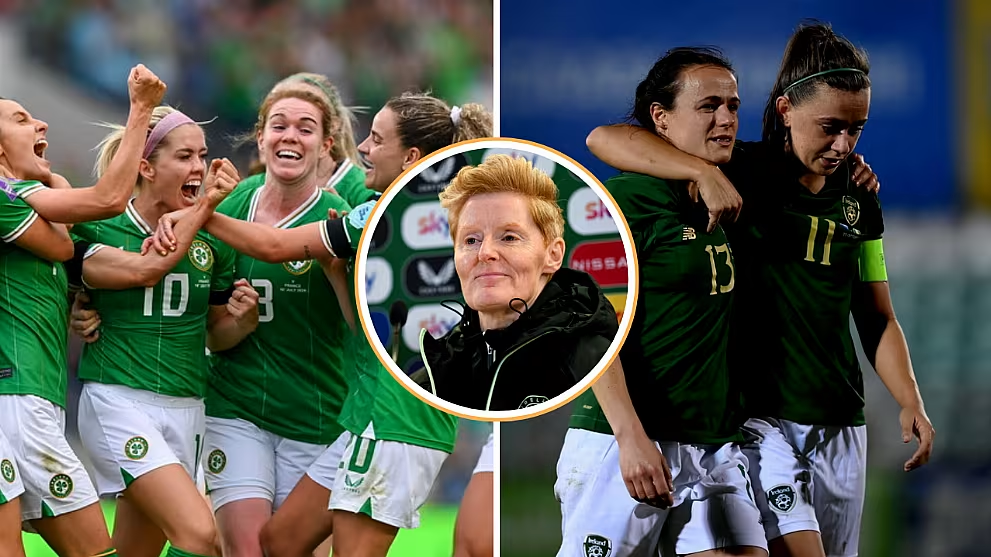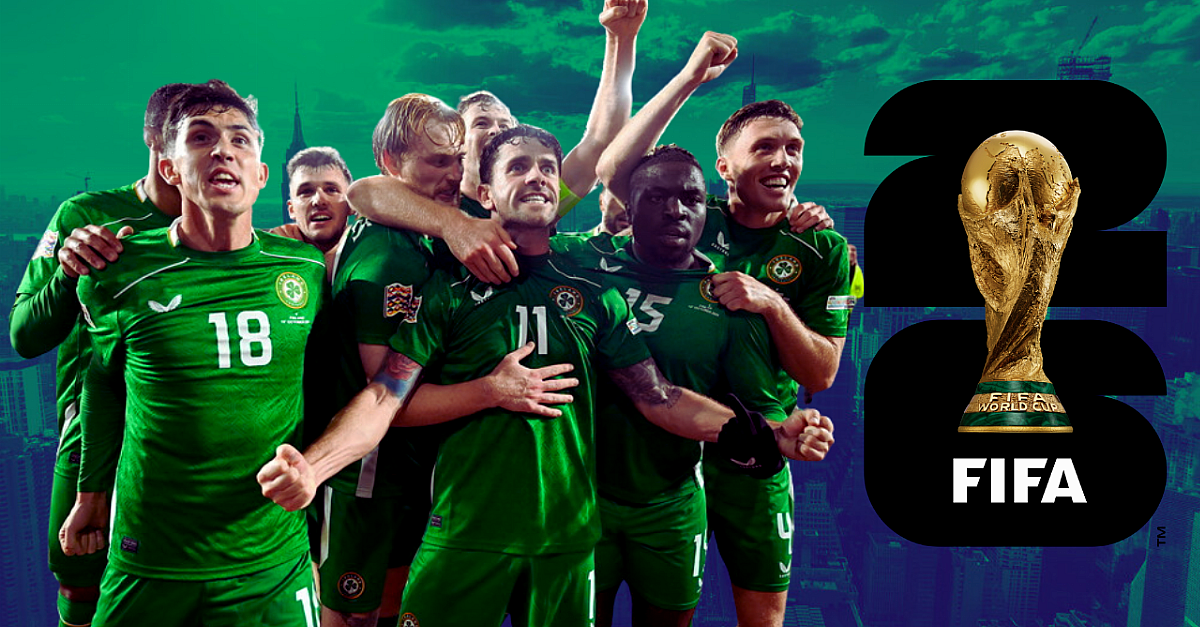With the Nations League league phase completed, Ireland’s path to the World Cup is now clearer.
You’ll notice that we used the word “clearer” rather than “clear” – in typical fashion, UEFA and FIFA have made this qualifying format as pointlessly complicated as possible.
There are a whole host of permutations at play but we’ve done our best to simplify it and break down what could be facing Ireland when the draw is made next month.
READ HERE: Paul Conroy Recalls Instagram Message From Séamus Coleman Which Helped His Recovery
READ HERE: John Aldridge: ‘If Alisson Is Fit, I Still Think The Manager Needs To Stick With Kelleher’
Ireland’s best and worst case scenarios for World Cup qualifying
What is the format for qualifying for the World Cup?
The number of spots available for European teams has increased for this World Cup, as the tournament expands from 32 to 48 teams.
Europe had previously been granted 13 spots at the World Cup – for the ’26 edition, they will have 16 teams in attendance.
UEFA will carry out the European qualifying draw on December 13. The format will see 12 qualifying groups take place over the course of 2025. The format and dates will be as follows:
- Six qualifying groups of five teams (matchdays from March-November)
- Six qualifying groups of four teams (matchdays from September-November)
All 12 group winners will qualify automatically, while the 12 runners-up enter the playoffs, alongside the four best Nations League group winners who have not already qualified automatically.
To explain why there are differently-sized groups, let’s take a look at what Ireland need to do to qualify.
Which size group will Ireland be in?
The four-team groups are mostly reserved for teams in Nations League playoff action during the first two group matchdays in March. With less than six teams fitting that criteria in pot three (Ireland’s pot), Ireland are guaranteed to be in a four-team group as they will be playing a relegation playoff in March.
(Ireland’s potential opponents for that relegation playoff are Slovakia, Kosovo, Bulgaria, or Armenia).
This means that Ireland’s qualifying group is likely to start in September rather than June, giving a window for another two friendlies next summer before Heimir Hallgrímsson has a full-scale qualification campaign to tackle as head coach.
Who CAN Ireland draw in World Cup qualifying?
As Ireland are likely to be drawn into a four-team group, they will not face any of the pot five teams (bottom seeds).
They are also likely to avoid some big-hitters due to being in a four-team group. Teams who are not involved in either the Nations League A quarter-finals or relegation/promotion playoffs are expected to be drawn into five-team groups, as they will be able to get their qualification campaign underway for the first two matchdays in March.
This means that Ireland are unlikely to be drawn against: England, Belgium, Switzerland, Austria (pot one); Sweden, Wales, Poland, Romania, Czechia, or Norway (pot two).
(This comes with a stipulation that the regulations around this are extremely technical and tricky to nail down with 100% certainty. However, reputable sources have listed the above teams as those that Ireland cannot be drawn against. H/t to John Fallon of the Irish Examiner on Twitter.)
By our reckoning, here is the full set of teams Ireland can be drawn against:
- Pot one: France, Spain, Portugal, Netherlands, Italy, Germany, Croatia, Denmark
- Pot two: Ukraine, Türkiye, Hungary, Serbia, Greece, Slovakia
- Pot three: Ireland are in pot three
- Pot four: Bulgaria, Kosovo, Belarus, Armenia, Estonia, Cyprus, Latvia, Azerbaijan, Kazakhstan
The eight teams in pot one are the eight teams who will play out the Nations League A quarter-finals next March. The four teams who progress from those quarter-finals will be guaranteed to take a pot-one slot in a four-team qualifying group. As there will then be only two six-team groups remaining, two of the teams defeated in the quarter-final phase will enter five-team qualifying groups and play their first games in June.
This means that, even when the draw is made for 2026 World Cup qualifying on December 13, many of the pot one slots in the groups will still be unknown until March.
The “best-case scenario”
Croatia, Slovakia, Ireland, Latvia
Following all of the above, the “best-case” scenario won’t look like a hugely appetising affair on paper to Ireland fans.
Croatia were World Cup finalists in 2018 but the vast majority of that team are either retired or close to the end of their careers. They were unlucky to exit the Euros at the group phase but, when weighed against the alternatives from pot one, they have marginally the worst squad.
Slovakia could well be Ireland’s opponents in the Nations League promotion/relegation playoff in March, and they will bring back painful memories from the Euro 2020 playoff defeat. They did have some impressive moments at last summer’s European Championships – most notably their brilliant victory over Belgium – but they are still a more attractive option than the other teams on offer to Ireland. Serbia would not be a disaster but they got the better of Ireland in 2022 World Cup qualifying.
Latvia are by far the lowest-ranked side in pot four and Ireland should have no difficulty getting two wins against them.
The “worst-case scenario”
Spain, Ukraine/Türkiye, Ireland, Bulgaria

27 March 2023; Kylian Mbappé of France with Nathan Collins at the Aviva Stadium in Dublin. A matchup with a European giant like France is on the cards. Photo by Stephen McCarthy/Sportsfile
The first one here speaks for itself – Spain are defending European and Nations League champions with a young squad who cruised through their most recent Nations League group. Drawing the Spaniards would be a disaster – though any of the European big-hitters would not be too far off, in truth.
The situation surrounding the draw is somewhat fortuitous for Ireland when it comes to pot two. The five-team groups will likely feature the likes of Sweden, Wales, and Norway, who would have been the toughest possible draws for Hallgrímsson and co. Nonetheless, Ukraine or Türkiye would pose a daunting mountain to climb. Ukraine defeated Ireland in Dublin in June 2022, while Türkiye impressed at this summer’s Euros.
Ireland should realistically be expecting to beat any of the teams in pot four but will have memories of the laborious pair of draws against Bulgaria early in the Stephen Kenny era in 2020.
One last time – what exactly do Ireland need to do to qualify for the 2026 World Cup?
Ireland will be drawn into a four-team group. They are a third seed, so they will have two higher-ranked teams in their group. They will play six games across the qualifying group between September and November 2025.
Each of the 12 group winners will qualify automatically for the tournament in North America. The 12 runners-up will enter the playoff phase alongside the four best group winners from this year’s Nations League who have not already qualified.
With Ireland having finished third in their Nations League B group, their only hope of reaching the 2026 World Cup is to finish in the top two of their qualifying group.
There’s a daunting task ahead for Heimir Hallgrímsson’s team – fingers crossed we’ll be celebrating success around this time next year.
SEE ALSO: Eileen Gleeson Confident Ireland Have Learned From Past Pain Ahead Of Euro Playoff


